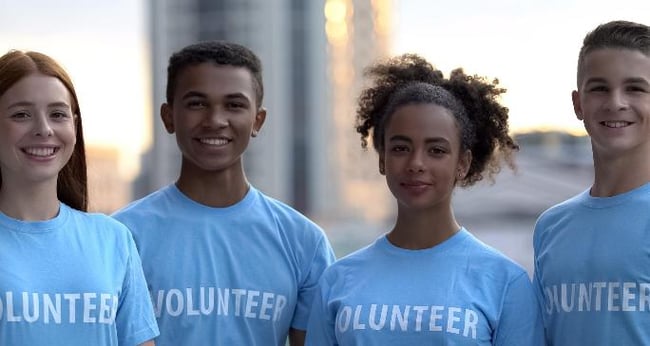Giving back to your community can help teens develop career and life skills – plus it can be a fun family activity!
Audrey Hepburn once said, “As you grow older you will discover that you have two hands, one for helping yourself and one for helping others.”
No matter how much generosity you think exists in the world, it’s safe to say there is always room for a little more. Many parents think about ways to teach their kids the value of generosity. One effective way to teach selflessness is to encourage volunteering at an early age.
Studies have shown volunteering can have lifelong benefits for youth and help develop attributes that will benefit them in school, their career and in life.
5 Things That Happen When Teens Volunteer
1. Increase self-esteem
Acts of philanthropy can lead to a greater feeling of self-worth because helping others is fun and can help a teen reflect on what they have and enhance their sense of purpose.
2. Gain more empathy
Volunteering helps teens see that not everyone’s life is like theirs. Helping people who have different life circumstances can help teens become more empathetic to everyone in their lives.
3. Become a Stronger College applicant
Having volunteer experience can be a great addition to a teen’s college application or resume. Colleges often look for well-rounded applicants and employers are more likely to hire people who are volunteers.
Volunteering helps and can be a key factor to securing a college scholarship. Many organizations offer scholarship funding to students who demonstrate community involvement and leadership skills. The scholarship awards are meant to appreciate and encourage students to give back to their community helping to make it a better place. The more hours you commit to volunteering, the higher your chances are of getting the award.
Tip: Make sure you keep track of your volunteering hours so that you can easily reference them when they are asked for on the scholarship application.
4. Build long-term generosity
Getting involved in philanthropic causes early in life can set up a teen for a life of generosity. People who volunteer when they are young are more likely to volunteer and donate to nonprofits and causes when they are older.
6. Earn better grades
Volunteering can also help teens academically. There is a positive correlation between students who earn good grades and those who are involved in community service. Volunteering helps teens gain new skills necessary for the job market such as leadership, communication skills, dependability, time management, and decision making.
family first
As the teen in your life gets involved in volunteering, take the opportunity to make it a family event. Young people who are from a family where at least one parent volunteers are almost twice as likely to volunteer themselves!
Take the first step in spreading generosity to the next generation by finding an upcoming volunteer activity in our area.
Get Involved
(Teens: Be sure to check with an adult before starting an activity to ensure safety.)
- Walk your neighbors dogs
If someone is temporarily unable to care for a pet, take the extra step to spend some time with that person as well. The pet’s owner may be feeling isolated or lonely. - Visit with an elderly neighbor or family member
Connect with people in your community who have trouble leaving the house and would benefit from short, regular visits. You can also help rake leaves, mow lawn, shovel snow or bring food. - Help younger students with homework after school.
If there is a subject that you excel in, consider offering help to your classmate or younger students who may not have access to tutors. - Grocery shop to help and elderly person and family to save time.
Getting to the grocery store can be cumbersome. This simple task may take less than an hour of your time per week, but will make a huge difference in someone’s life. - Provide free child care to family members or friends.
If you’re responsible and experienced with children, helping with child care can be a fun way to help out a member of your family or the community. - Fundraise for a cause you care about.
Many fundraisers involve races or walks, which have the added benefit of physical activity. Find a cause close to your heart and ask friends and family to support it, too. - Donate old clothes or toys.
You’ve likely outgrown a few pairs of pants or toys you no longer use. Clean out your closets and give away gently-used items to your favorite charity.
.jpg)




